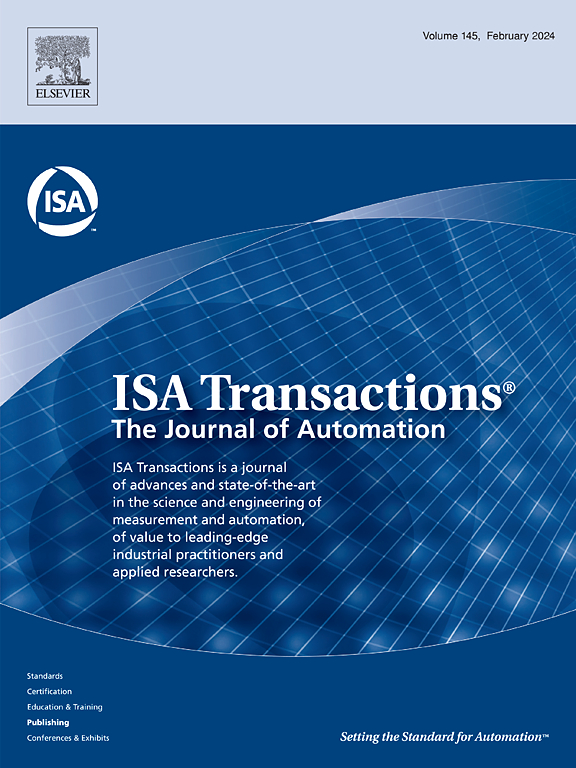滤波比例-积分-导数控制器在常规操作条件下的自整定。
IF 6.3
2区 计算机科学
Q1 AUTOMATION & CONTROL SYSTEMS
引用次数: 0
摘要
一般来说,PID控制器的自整定实现依赖于双控制器、激励/识别实验或过程的一些先验知识,因此在自整定实现上发生了相当大的成本。针对这一问题,提出了一种新的FPID控制器自整定方案,用于闭环系统在除自然干扰外无任何外界激励的情况下运行的最小方差任务。本文揭示了当扰动模型的时滞和阶数满足前提时,随机扰动模型可以唯一地由闭环系统的脉冲响应系数的前几项确定。利用单次闭环输出数据在线估计闭环非参数模型(以脉冲响应系数表示),通过求解优化问题估计扰动模型,从而得到对象模型。随后,通过求解闭环传递函数H2范数的优化问题,在线更新FPID控制器的新参数集。与现有的自调谐方法相比,所提出的方案的优点是由于以下事实节省了自调谐实现的成本:i)它不依赖于双控制器或识别/激励实验;Ii)不需要事先了解工艺。通过数值算例和工业实例说明了该方法的有效性。本文章由计算机程序翻译,如有差异,请以英文原文为准。
Auto-tuning of filtered proportional-integral-derivative controller for industrial processes under routine operating conditions
In general, auto-tuning implementation of PID controllers relies on dual controllers, exciting/identification experiments or some prior knowledge on the process and hence the considerable cost on auto-tuning implementation occurs. To deal with such a problem, a new auto-tuning scheme of the FPID controller is developed for minimum variance tasks under routine operating conditions in which the closed-loop system is running without any external excitation other than natural disturbances. This paper reveals that the stochastic disturbance model can be uniquely determined from the first several terms of the impulse response coefficients of the closed-loop system when the precondition on the time delay and the order of the disturbance model is satisfied. Based on the closed-loop non-parametric model (in terms of impulse response coefficients) that is estimated online by utilizing the one-shot closed-loop output data, the disturbance model is estimated by solving an optimization problem and hence the plant model is obtained. Subsequently, the new parameter set of the FPID controller is updated online by solving an optimization problem with respect to the H2 norm of the resulting closed-loop transfer function. The benefit of the proposed scheme over the existing auto-tuning methods is the cost saving of the auto-tuning implementation due to the following facts: i) it does not rely on dual controllers or identification/exciting experiments; ii) it does not require prior knowledge of the process. The effectiveness of the proposed scheme is illustrated in terms of output variance index by numerical cases and industrial examples.
求助全文
通过发布文献求助,成功后即可免费获取论文全文。
去求助
来源期刊

ISA transactions
工程技术-工程:综合
CiteScore
11.70
自引率
12.30%
发文量
824
审稿时长
4.4 months
期刊介绍:
ISA Transactions serves as a platform for showcasing advancements in measurement and automation, catering to both industrial practitioners and applied researchers. It covers a wide array of topics within measurement, including sensors, signal processing, data analysis, and fault detection, supported by techniques such as artificial intelligence and communication systems. Automation topics encompass control strategies, modelling, system reliability, and maintenance, alongside optimization and human-machine interaction. The journal targets research and development professionals in control systems, process instrumentation, and automation from academia and industry.
 求助内容:
求助内容: 应助结果提醒方式:
应助结果提醒方式:


